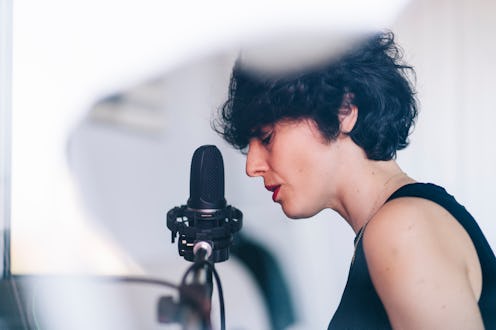Life
Another Reason To Stop Mocking Vocal Fry

"Vocal fry," when someone's voice drops into a throaty, creaky taper, has been under possibly sexist attack in recent years. But, as new research shows, vocal fry is more expressive than just a regular voice when used by female singers. Looks like vocal fry has a valuable purpose after all! Take that, haters.
At a recent meeting of the Acoustical Society of America, vocologists from the University of Texas at San Antonio presented findings about the expressive effect of vocal fry in female singers. John Nix and Mackenzie Parrott had played audio clips for 58 participants. They featured a man and a woman singing pop and country samples, both with and without vocal fry. In general, the listeners thought that the female singer was more expressive when she used vocal fry. Also interestingly, the listeners though the male singer was less expressive when he used vocal fry.
The lesson for singers is pretty clear — use vocal fry judiciously in the way it's likely to be interpreted for a singer of your gender. Nix is conducting further research relevant to singers, such as to figure out how far vocal fry can carry (it works better when amplified, because it's hard or impossible to produce the effect when you have to sing or speak loudly).
I can't help but wonder if the expressiveness of vocal fry (that makes it beneficial to female singers) is exactly why vocal fry in female speakers is frowned upon in ordinary life. These probably aren't two entirely separate and coincidental phenomena. For instance, take this research using voicemail messages left by pretend job candidates and listeners who rated them. It suggests that candidates using vocal fry are less likely to be hired for a job (and women listening to women using vocal fry rated them particularly harshly, oops). Though I doubt the raters in this experiment thought this through consciously, it's plausible that they made assumptions about the candidate's age (younger) and emotionality (higher) based on the vocal fry. And because people like people who speak in "normal" ways too, women who speak with low vocal fry are penalized even more, for being out of typical gender range.
In any case, know that you have control over vocal fry, whether you want to use more or less of it. Vocal fry is not just the natural state of young women's voices, though young people and women do seem to like using vocal fry more than other groups. Expressiveness is often a good thing, sure, but in some cases you might want to deliberately limit it.
Since vocal fry is the product of too little air going over your vocal cords as you vocalize, you can prevent vocal fry (and its negative perceptions and job market penalties) by taking big breaths before you speak and focusing on projecting your voice all the way to ends of sentences. It's one thing to use some vocal fry for effect now and then, like skillful singers. Though vocal fry per se should not be considered a problem, if someone of any age or gender is actually a lazy speaker or chronically under-confident about what they're saying, those might need work too.
Images: Westend61/Westend61/Getty Images, Giphy